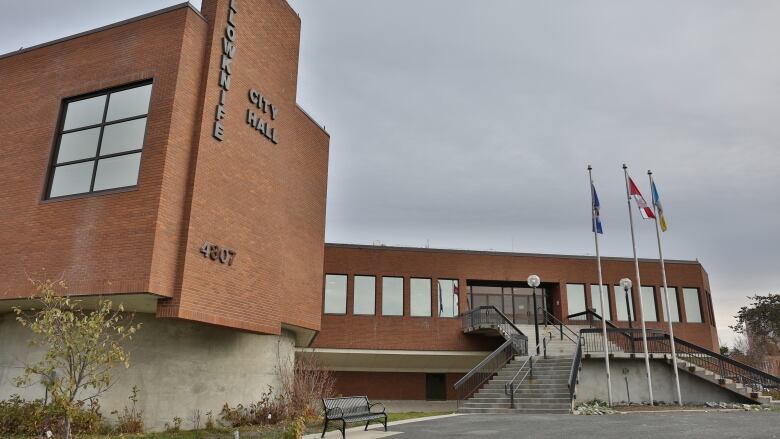Mayor Rebecca Alty on Yellowknife city council's vaccine mandate divide
Council votes on whether to adoptavaccine mandateat city facilities on Monday,Nov. 8

Plans to introduce a proof of COVID-19 vaccine policy to access City of Yellowknife facilities took a 180 degree turn this week.
The policy, presented by city council Monday,would allow greater capacity at public facilities like the library and the fieldhouse, but it would ban people who choose not get vaccinated.
Five city councillors objected to the idea, includingNiels Konge, Steve Payne, Stacie Smith, Rommel Silverioand Robin Williams. Mayor RebeccaAlty and councillors Shaun Morgan and Julian Morse expressed support for the policy. Coun. Cynthia Mufandaedza was not present.
The official vote on whether to adoptthevaccination mandatetakes place Monday,Nov. 8 at 7 p.m.
She spoke withCBC's Loren McGinnis, host of The Trailbreaker, Wednesday morning.
Questions and answers have been edited for length and clarity.
How did we get from an administration proposal to introduce a proof of vaccine program to a motion to reject a proof of vaccine program?
The chief public health officer has offered not only the city, but businesses two options:you can keep your capacity at 25, or if you implement proof of vaccine, you can increase your capacity. And so for the city, it was deciding whether we want to go with Option A or Option B.
Option A is basically returning to what we had last winter, which was caps of 25 in our facilities, you have to sign up to go to public skate, public swim, sign up to go to the library, or go to this other system, which is going to increase [capacity]and almost go back to "normal."
This is about city facilities and programs, so public swim, public skates ... the public library, but user groups also have to submit their plans to the chief public health officer.
For example, N.W.T. soccer has a proof of vaccine, and so they've already got approval to have up to 100 people per field. Hockey [N.W.T.] submitted plans and they got approval for up to 50 per rink.
So whether the city goes with the proof of vaccine system or not, those user groups still get to have their numbers.
Five councillors are opposed to this proof of vaccine program. Can you explain how this debate divides council right now?
I think for the five that were voting against the policy [it] was very much to ensure that the facilities are available for everybody, regardless of [vaccination] status. And then, for those of us that were in favour of the policy, it was about increasing the capacity and ensuring that we have a safe space for both employees, as well as patrons that are coming.
Recreation facilities are [used by] a lot of under 12 year olds, and they can't get vaccinated. So it's about ensuring that we're looking after the people that can't get vaccinated, which is under 12, as well as you know, immunocompromised individuals, who can get the vaccine and people have, but they're still at a higher risk of getting COVID, even with the vaccine, because their conditions. So, that's kind of where it came down.
And and I do want to point out that ... residents are encouraged to come to the meeting and they can say why they're in favour or against. They have five minutes to speak and then there's question from council and then we move on to the next speaker. [Residents must first email the city clerk to get on the speaker's list and to get a link for the virtual meeting.]
I know there was people calling for a public referendum and more public discussion about this, but really the opportunity is to come Monday at 7 p.m. and and you can say your piece. If you don't feel comfortable speaking in public, you can always just emailyour concerns.
Do you have a sense of why some may be in favour ofkeeping capacity lowversus those in favour ofintroducing mandatory vaccination?
City staff come forward with their technical recommendation and I do think it aligns with council [which] set some some policy objectives for administration at the start of COVID, which was ensuring the health and safety of residents making fiscally responsible decisions. So I do think that the policies ...and the recommendation they brought forward fit council's policy objectives, regarding COVID. But at the end of the day, the decision rests with council because it has budget impacts, it has service level standard impacts.
How do you address the concern that people who are against being vaccinated, but who are taxpayers in Yellowknife should be able to have access to city facilities?
That was one of the, I would say, common themes represented by those who are against [the policy].
It's tough. I heard from so many families last year that it was impossible to get into family, swim, public swim, all that stuff. So, you know, we could increase the capacity.
Public swims, pre-COVID, we were averaging 100 to 150 residents. So to keep 25 is, you know, four or five, six families that are able to get in. So one way or the other, there's going to be more people that can't access the services, if we keep the numbers at 25 versus increasing the numbers.
I do think that it's important too, for the health and safety of our staff knowing that residents coming in, have their vaccine. And, yes, having the vaccine doesn't mean that you're immune to COVID but it greatly reduces your hospitalization risk, fatality risks. So there are differences in being vaccinated and unvaccinated.
Written by Amy Tucker, will files from Loren McGinnis












_(720p).jpg)


 OFFICIAL HD MUSIC VIDEO.jpg)
.jpg)



























































































